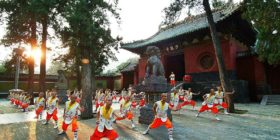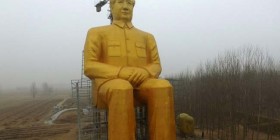People wearing Islamic-style clothing and large beards are banned from riding public buses during the Xinjiang Sports Games in northwestern China, a Communist Party-run newspaper reports.
The ban went into effect Monday in the city of Karamay, in the country’s restive northwestern Xinjiang region.
It applies to passengers who wear veils, large beards, as well as three types of Islamic dresses — including those with the star and crescent symbol — according to the Karamay Daily, a newspaper affiliated to the Chinese Communist Party.
Dozens of public bus stations in the city will be manned by security personnel to conduct checks.
The bus ban is being touted as one of a number of a security measures as the city hosts the 13th Xinjiang Sports Games, a large event in the autonomous region, the paper said, citing the event’s organizing committee. The ban will be enforced through August 20, when the Games come to an end.
Officials said those who violate the ban will be reported to the police, the paper reported.
Uyghur rights groups have criticized the measure, calling it a “green-light” for racism.
“Officials in Karamay city are endorsing an openly racist and discriminatory policy aimed at ordinary Uyghur people,” Uyghur American Association president, Alim Seytoff said in a statement.
“The concern is officials feel they can flaunt the laws of China in order to implement Xi Jinping’s one year anti-terror campaign that appears more and more to be a wholesale onslaught against the Uyghur peoples’ religious beliefs and practices.
“What this bus ban tells us is that Uyghurs in China have fewer rights than other citizens, even in their homeland, and that it green-lights discrimination against Uyghurs by ordinary Han Chinese.”
Dozens of public bus stations in the city will be manned by security personnel to conduct checks.
The ban on bus riders wearing beards and Islamic-style clothing does not specifically single out Uyghurs, but its language clearly points to them as potential targets of the restrictions.
It comes about a month after the Chinese authorities in the region banned students and civil servants from fasting during Ramadan, the Muslim holy month.
In recent years, the Xinjiang region has seen an uptick in violence between Uyghurs and Han Chinese over economic and other issues.
Last week, nearly 100 people — most of them “terrorists,” according to state media — were killed in an attack in the region.
A total of 37 civilians died, and police “gunned down 59 terrorists,” the Chinese state-run news agency Xinhua reported, bringing the death toll to 96.
There have been numerous attacks in the region, where tensions are simmering between Uyghur Muslims, a Turkic people, and Chinese Han people.
A Muslim separatist group founded by militant Uyghurs has been blamed for terrorism in the area, the Council on Foreign Relations explains.
Xinhua said the “mastermind” behind the attack last week “had close connections with the terrorist organization,” known as the East Turkestan Islamic Movement.
Karamay is a resource-rich city of some 450,000 people located in northwest Xinjiang, which has a dense Uyghur population.






Leave a reply